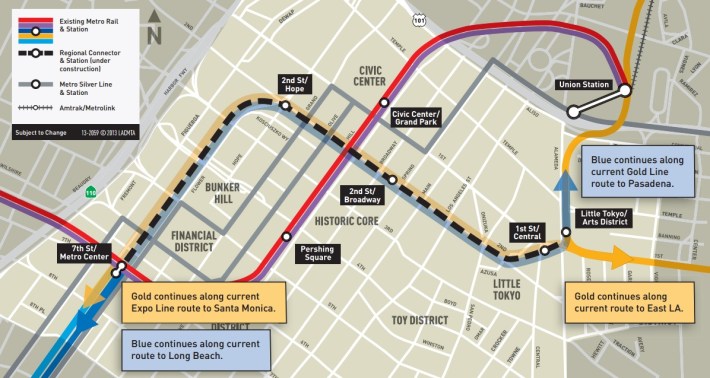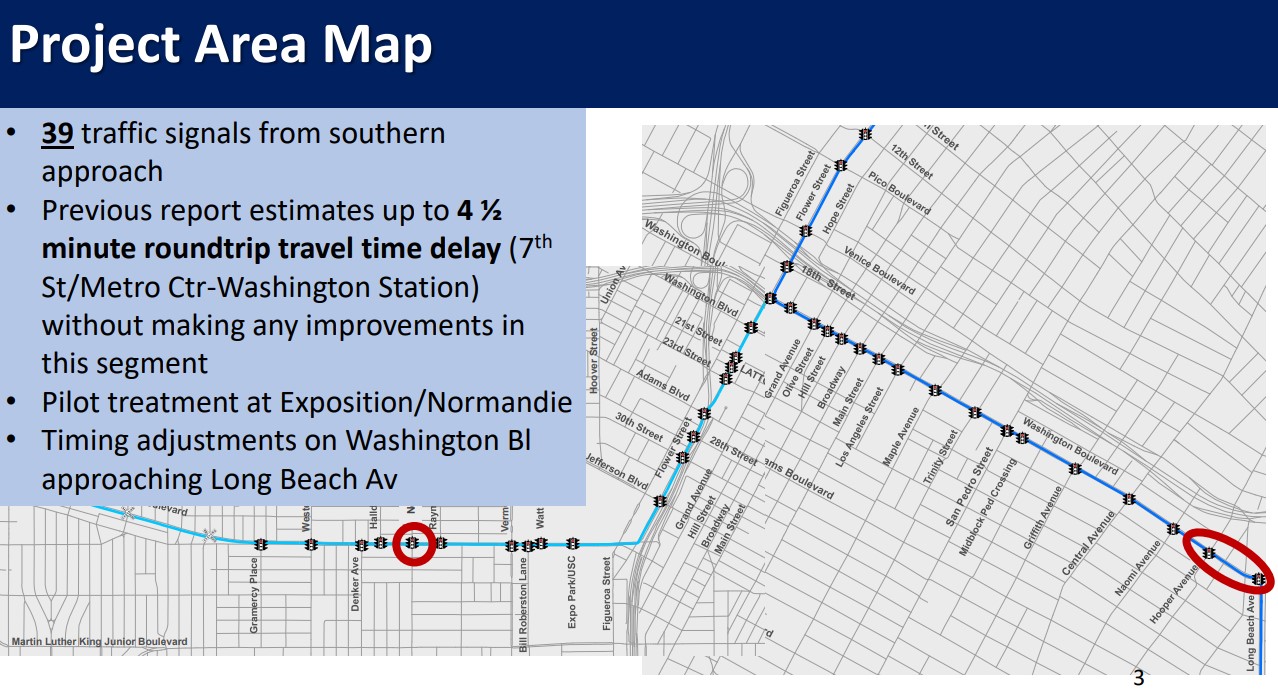Yesterday morning, Metro staff responded to an October 2020 motion regarding how to make Regional Connector operations smooth and reliable. As part of this effort, Metro is looking into several upgrades that could help speed up existing light rail lines.
The under-construction 1.9-mile $1.8 billion Regional Connector light rail subway will tie together the Metro A (Blue), E (Expo), and L (Gold) Lines to offer one-seat travel from East L.A. to Santa Monica and from Azusa to Long Beach. The Connector is anticipated to open to the public around late August 2022.

Today, the Metro A and E lines already experience some issues in Downtown L.A. where both lines run at grade on trafficked streets, sharing one set of tracks between Washington Boulevard and 7th Street Station. Even with Metro making efforts to operate efficiently, the shared tracks have resulted in some delays and some unreliability. Today, when the E Line experiences a delay, it can spill over into delays on the A Line - and vice versa. After the connector ties the Foothill and Eastside Gold Line segments into the A and E Lines, there is even more potential for delays on one line to affect greater numbers of other parts of the system.
In yesterday's presentation (staff report, slide show) Metro Director of Service Planning Stephen Tu noted that Metro has added GPS devices on several trains to collect better data on where delays are most common.
Tu related that Metro recently worked with the L.A. City Department of Transportation (LADOT) to give E Line trains better signal prioritization - and that additional signal priority improvements are in the works for both the A and E Line. The current upgrades were implemented during the recent lull in rider, train, and car traffic during the pandemic. Metro and LADOT are monitoring and adjusting prioritization as trips increase during the current recovery.
Tu noted that A Line trains experience delays at Washington Station, where they turn from a dedicated right of way into the middle of Washington Boulevard. Metro and LADOT are working to implement adjustments quickly in these areas.
Per Tu, Metro is also studying increasing train speeds in outlying areas. Where the A Line operates on its own dedicated right of way - north of Long Beach and south of downtown L.A. - trains travel at up to 55 miles per hour. Running somewhat faster would improve end-to-end travel times.
Overall, according to Tu, operations anticipates it will need $30 million for reliability improvements for trains approaching the shared Regional Connector tracks. Tu stated that Operations will come back to the board in January to present a more detailed plan for improvements. Tu stated that, if the board approves funding in January, many of the improvements can be completed in the short run, before the Connector opens.
These relatively-inexpensive relatively-quick fixes are needed yesterday. They will improve travel times, improving the quality of life for transit riders.
But, in the longer run, tying together of more and more rail lines in downtown L.A. puts more pressure on the weak points in the system, especially where light rail lines operate along Flower Street from Washington Boulevard into downtown. Various experts have pointed out that, especially in this area, Metro and the city of L.A. have failed to sufficiently prioritize rail vehicles carrying 100+ riders over personal cars carrying one driver.
Tu noted that Metro is looking at longer term improvements for that stretch (see Metro's 2017 analysis) including how to reconfigure the Washington/Flower wye intersection. Ultimately it may take some political will to go past worthwhile half-measures, and truly prioritize transit on Flower - even it means closing a freeway on-ramp. Major reconfiguration of rail along Flower will be expensive, and will certainly not take place before the Regional Connector opens late next year.






